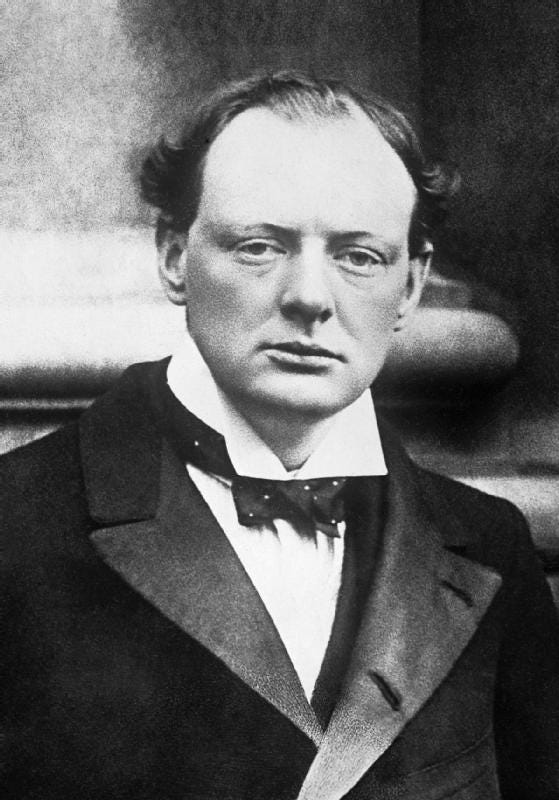Hidden Talents, Winning Teams (part 5)
When does the "Reverse Peter Principle" apply?
Last week, he introduced the “Reverse Peter Principle,” a phenomenon in which some people do not “rise to the level of their incompetence” but instead perform better as they rise into more and more challenging situations. We used basketball player Derrick White to demonstrate this point.
Derrick White is, of course, not the only example of this principle. Once we notice it, we can see it occur throughout many fields. Winston Churchill, for instance. Surely, earning A’s in school is objectively “easier” than leading the British Royal Navy, which is itself less challenging than leading the country itself as it faced its greatest existential threat in 400 years. Yet Churchill was a poor student and a mediocre military leader (leading the disastrous Gallipoli campaign in WWI). His greatest successes came in his most difficult role.
Here's another example. Which of these three would you consider a most difficult task:
A) Earning a strong performance review as a technology hardware salesman
B) Serving as Director of Retail Operations for a retail business with four locations and $4 million in revenue
C) Leading a company that nearly doubles in size every year for 13 consecutive years, going from $1 million in revenue to over $2 billion.
Most of us would agree that C is the most difficult, followed by B. There are many thousands of people who can successfully achieve A.
And yet, Howard Shultz earned a 3 out of 5 on his reviews as a Xerox salesman and was considered promising but flawed as the Director of Retail Operations for Starbucks, yet was able to achieve tremendous success once he became CEO. The more difficult the challenge, the more successful he was.
We can find numerous other examples, though perhaps not as numerous as we might otherwise, were in not for the fact that the Reverse Peter Principle buts into Reverse Survivorship Bias—people who struggle in lower roles rarely get the opportunity to see what they can do more challenging situations.
So, how can we explain this occurrence?
One explanation is that people just try harder when they are in more difficult situations. As Shakespeare wrote, “Some are born great, some achieve greatness, and some have greatness thrust upon them.” Perhaps those who have “greatness thrust upon them” are just able to rise to the occasion through greater focus and effort.
In reality, though, most people are trying hard in every role. Take the examples above. Derrick White didn’t average 17 points per game in high school (instead of, say, 30 points per game) because he wasn’t trying. Churchill’s efforts at Gallipoli didn’t lead to 250,000 deaths because the Royal Navy leader was insufficiently challenged. Shultz’ experience as a Xerox salesman, in which “the rejection every day was so significant,” was certainly not the result of laziness.
No, people try hard throughout their careers. But requirements for their roles are different.
Let’s look again at Derrick White. To be considered among the two or three best players in your State in high school and a potential NBA prospect, one skill matters more than any other: the ability to score lots of points against a defense designed to stop you. This situation remains true in college; the best players draw the majority of defensive attention, and the ones who can reliably score in that situation are the most valuable.
But what if you don’t attract the most defensive attention? What it there is someone else on your team who plays that role? Then, your ability to attack a defender 1-on-1 or even 1-on-2 and find a shot is far less valuable. Instead, your ability to hit open shots directly off a pass from a teammate becomes more valuable, as does your ability to do other things that do not involve having the ball in your hands: defending, rebounding, moving without the ball, etc.
As Derrick White’s level of basketball gets higher and higher, the relative value of the skills he possesses become relatively more important, and the value of the skills he lacks become less important. When your team has LeBron James and Kevin Durant and Stephon Curry, and when the ball will be in their hands 90% of the time, your ability to do exciting things with the ball in your hands is not especially important. Your ability to do all the other things that contribute to winning, is.
And thus we arrive at a key point in the Reverse Peter Principle. If we are predicting how much success someone will have at a higher level or in a more difficult role, the best information we have is not always how successful they are at their current role. If the skills and mentality required for the new role are a better match with he skills they possess, they may succeed despite the role being more “objectively” difficult.
Next week, we will compete this series with a look at a few further implications of the Reverse Peter Principle for business leaders.
Thanks,
The Impactful Executive Team
PS - free free to share this newsletter with anyone that would find it useful.
Whenever You’re Ready, There Are 3 Ways We Can help You:
Find out more about TIE’s Top Team High Performance Program. Visit ImpactfulExec.com, read our 5-slide TIE teaser or 20-slide full TIE introduction.
Score your organizational health. Measure across our three levers, three levels, and nine elements using our 7-min Diagnostic assessment and emailed pdf report.
Improve your top team’s performance. Send us an email if you have further questions and schedule a 15-min triage call to see if we can help you.




